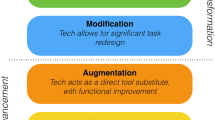Abstract
The STS education movement is identified and related to the critique of technology of the 1960s–1970s. The critics of technology included the system of education in their critiques. There is a practical tension or “contradiction” in attempting to develop their insights within the curriculum routines of the schools and colleges. This tension is explored under six categories: reductive knowledge, socialization of technical modes of thinking, technicalized processes of learning, the loss of meaning, radical monopoly over learning, and the socialization of secular values.
Similar content being viewed by others
References
Aikenhead, G.: 1985, in D. Gosling, and B. Musschengs (eds.), Science Education and Ethical Values: Introducing Ethics and Religion into the Science Classroom and Laboratory, World Council of Churches and Georgetown University Press.
Boyer, Ernest: 1983, High School, New York: Harper and Row.
Bledstein, Burton: 1976, The Culture of Professionalism, New York: Norton.
Brockway, J.: 1986, ‘Technology and the liberal arts’, Technological Literacy, Bulletin of Science, Technology and Society 6, (2/3).
Bybee, Roger, ed.: 1983, Science/Technology/Society, Annual Yearbook of the National Science Teachers Association.
Carnoy, Martin: 1987, ‘High technology and education: an economist's view’, Chapter Four in Benne and Tozer (eds.), Society as Educator in an Age of Transition, 86th NSSE Yearbook, University of Chicago Press, pp. 88–111.
Curriculum Review. (Entire January 1985 issue devoted to STS education).
Cutcliffe, Steve: 1987, ‘Three stages in the evolution of STS studies’, Mimeo, Lehigh University.
Ellul, Jacques: 1964, The Technological Society, New York: Knopf.
Global 2000, A Report to the President of the United States. Entering the 21st Century: 1980. Prepared by the Council on Environmental Quality and the Department of State, Gerald Barney, Study Director. New York: Pergamon.
Heilbroner, Robert: 1974, An Inquiry into the Human Prospect, New York: Norton.
Heilbroner, Robert: 1975, Business Civilization in Decline, New York: Norton.
Hickman, Faith, John Patrick, and Roger Bybee: 1983, Science/Technology/Society: A Framework for Curriculum Reform in Secondary Science and Social Studies, Boulder, Colorado: Social Science Education Consortium.
Illich, Ivan: 1971, De-schooling Society, New York: Harper and Row.
Illich, Ivan: 1973, Tools for Conviviality, New York, Harper and Row.
Klein, Margrete Seibert and F. James Rutherford: 1985, Science Education in Global Perspective, Boulder, Colorado: Westview.
Meadows, Donella et al.: 1972, The Limits to Growth: A Report to the Club of Rome.
National Science Board: 1983, Educating Americans for the Twenty-First Century. Washington: National Science Foundation.
National Science Teachers Association: 1982, ‘Science/Technology/Society: Science education for the 80's’.
Nussbaum, Bruce: 1983, The World After Oil, New York: Simon and Shuster.
Roy, Rustum: 1984, ‘STS: The megatrend in education’, Proceedings of 1984 International Congress on Technology and Technology Exchange, Pittsburgh.
Schumacher, E. F.: 1973, Small Is Beautiful, New York: Harper and Row.
Spiegel-Rosing, Ina Susanne and Derek de Solla Price: 1977, Science, Technology and Society: A Cross-Disciplinary Perspective, Beverly Hills: Sage.
Waks, Leonard J.: 1973, ‘Re-examining the validity of arguments against behavioral goals’, Educational Theory 23(2), pp. 133–143.
Waks, Leonard J.: 1974, ‘Non-behavioral goals’, Curriculum Theory Network 4(1), pp. 37–42.
Waks, Leonard J.: 1975, ‘Educational objectives and existential heroes’, in R. A. Smith (ed.), Regaining Educational Leadership, New York: Wiley.
Waks, Leonard J.: 1987a, ‘A technological literacy credo’, in L. Waks (ed.), Technological Literacy II, Bulletin of Science, Technology and Society 7(1/2), pp. 357–66.
Waks, Leonard J.: 1987b, ‘The oil in the machine: Jacques Ellul on human techniques in the technological society’, Research in Philosophy and Technology 9.
Waks, Leonard J.: 1988a, ‘Science, Technology, Society (STS) education and citizen participation’, working paper, Center for Philosophy and Public Policy. University of Maryland.
Waks, Leonard J.: 1988b, ‘The responsibility cycle in STS education’, working paper, National STS Education Support Network, Penn State University.
Waks, Leonard J, and Rustum Roy: 1987, ‘Learning from technology’, Chapter Two in Kenneth Benne and Steven Tozer (eds.), Society as Educator in an Age of Transition, Part One of 88th Yearbook of the National Society for the Study of Education. Chicago.
Winner, Langdon: 1972, ‘On criticizing technology’, Public Policy 23(4).
Author information
Authors and Affiliations
Additional information
Leonard J. Waks has earned Ph.D.'s in philosophy (Wisconsin, 1968) and organizational psychology (Temple, 1984). He has taught philosophy at Purdue, Stanford, and Carnegie Mellon, and been a member of the faculty of the Graduate School of Education at Temple University. Since 1985 he has been Professor of Science, Technology and Society at Penn State.
Rights and permissions
About this article
Cite this article
Waks, L.J. Critical theory and curriculum practice in STS education. J Bus Ethics 8, 201–207 (1989). https://doi.org/10.1007/BF00382585
Issue Date:
DOI: https://doi.org/10.1007/BF00382585



